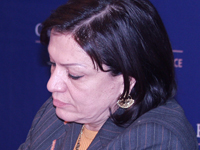Registration
You will receive an email confirming your registration.
IMGXYZ1169IMGZYXThe United States and Egypt share strong mutual interests in the Middle East and the arrival of a new administration in the U.S. offers a chance to rebuild relations. Nonetheless, differences over political reform and human rights issues in Egypt are likely to persist.
In a discussion moderated by Senior Associate Michele Dunne, Mona Zulficar, member of Egypt's National Council on Human Rights; and Tamara Cofman Wittes, Director of the Middle East Democracy and Development Project at the Saban Center at Brookings, discussed the future of U.S.-Egypt relations in light of domestic and regional developments.
Ms. Zulficar argued:
- Egypt continues to make progress in areas of political and social reform, and civil society is dynamic. The United States should persist in supporting democratization efforts and civil society’s fight for human rights. Egypt continues to be a trend-setter for the Middle East and positive developments in democratization will affect the entire region.
- The United States must work to resolve the Arab-Israeli conflict. The outbreak of Arab-Israeli violence sustains religious extremism and hinders efforts to promote religious moderation in Egypt and elsewhere.
- The constitutional ban on religious parties is necessary, and the Muslim Brotherhood should only be allowed to form a party if it will be completely civil and non-religious in nature. No politician should be allowed to speak “in the name of God.”
Dr. Wittes responded:
- The United States and Egypt must work together to face growing Iranian influence, Iraqi stability, and the aftermath of the Gaza war. These developments require the United States and Egypt to align their strategic interests and cooperate.
- Another part of the “revisionist critique” presented by Iran and its allies is the lack of democracy and respect for human rights in Arab states. Arab allies are ready to adopt a regional view of conflicts in the Middle East because it allows them to ignore the needs of their domestic constituencies. The United States must promote policies that address the lives and interests of the region’s people.
In the question and answer session, participants raised issues including revisions to Egypt’s law on non-governmental organizations, whether the National Council on Human Rights enjoys true independence from the government, the persistence of torture in Egypt and its effects on government-citizen relations, and the challenges presented by the possible rise of religious groups to power through elections.
